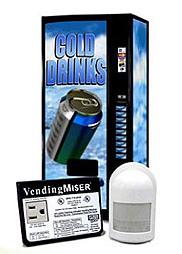What is it/ How does it work?/ CO2 reduction
The City purchased 285 energy misers, energy saving devices, for cold beverage vending machines in City facilities. Dr. Pepper Co., the City’s vending machine franchisee, installed the misers at no cost. This low cost energy saving measure saves 265,303 kWh per year.
The City also requested that FreshBrew, the City’s snack machine vendor, remove the light bulbs in all snack machines. At current usage rates, this cost-free energy saving measure saved the City 74,285 kWh per year.
Thus, in total the City saves 339,588 kWh per year with these two measures, which equates to a $34,712 per year electricity cost savings and 277 tons per year in CO2e emissions reduction.
Next steps
The City of Houston continues to look for innovative, simple ways to save energy and therefore costs and emissions within the City’s internal operations.
For instance, in April of 2008, the U.S. Department of Energy (DOE) selected Houston as one of 12 cities to be recognized as a Solar America City. With this recognition came a $200,000 DOE grant and a matching required grant of $200,000 from BP Solar. These funds were to be used to develop a strategy and plan for solar infrastructure in the region.
As such, with the funds, the City has installed solar panels on two of the City’s buildings, the City Hall Annex and Code Enforcement Building. Each array of solar panels is expected to generate about 12,000-kilowatt hours of electricity per year. Since installation in June of 2008 (to March 2009), we have produced 13,908 kWh of power, netted a revenue of $6502, and had a small reduction in CO2 emissions of about 9 tons. These positive energy and cost savings and environmental benefits have shown how successful such solar programs can be.
Another example of the City saving energy and therefore costs and emissions is the energy reduction project. In September 2007, the City of Houston, with guidance from the Clinton Climate Initiative (CCI), contracted the services of two energy services companies, or ESCOs, to develop, install, and finance projects designed to improve energy efficiency and decrease maintenance costs for facilities over a seven to twenty year period. These ESCOs act as a project developer for a wide range of tasks and assume the technical responsibility and financial risk associated with the project implementation.
The ESCO evaluated the energy-saving opportunities in 271 City facilities or 11 million square feet, and then recommend a package of improvements to be paid for through savings. The energy savings agreement will guarantee a 30% or 34,369,963 kWh reduction in energy use in these buildings. Many types of building improvements can be undertaken through such an agreement, including new lighting technologies, boilers and chillers, and energy management controls. The ESCO has the potential to reduce emissions by 27,472 tpy CO2e
Application
Over the past five and a half years, the City of Houston’s goal, under the leadership of Mayor Bill White, has been to transform the city from the “energy capital of the world” to the “energy efficiency capital of the world”. Therefore, under the Mayor’s leadership the City of Houston has led by example. Several policies and projects aimed at reducing expenses and thus reducing energy use and GHG emissions have proliferated. The vending machine/vending miser project is no different. This project, like the solar panels and ESCOs project, aimed to reduce the City’s internal operations’ energy use to save money, improve the environment, and demonstrate to the community that energy savings equates to cost and emission savings as well.



